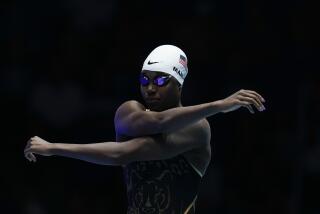An Electric Fence
En garde, Seoul, here comes Dan DeChaine--a Claremont swashbuckler without whom the U.S. Olympic fencing team wouldn’t stand a chance.
No, DeChaine isn’t a fencer, not any more. Nor even a coach, not any more. DeChaine is a manufacturing engineer for General Dynamics. That’s his job. His passion, though, is fencing, and his title--at once quaint and avant-garde--is armorer to the American team.
Armorer, of course, is an ancient skill that fell into desuetude when the invention of gunpowder took the joy out of hand-to-hand combat. “A lot of fencing masters and craftsmen were thrown out of work,” says DeChaine, only half-kidding, “so fencing was turned into a sport.”
The sport itself then was transformed, due to frailty, chicanery or both. “Nowadays,” says DeChaine, “for accurate scores without depending on the error-prone human, fencing has gone electronic.” (Foil--touches on vests woven of metallic cloth--is electronic. So is epee, where a touch may be scored anywhere, hand to mouth and beyond. Saber will follow Jan. 1.)
Enter DeChaine, one of the world’s very few master armorers. His mission is to maintain the team’s weapons in fighting form--to buckle the team’s swashes, as it were. It is a job of infinite delicacy: “For example, the switch in the tip of the epee must travel at least 1 millimeter, with at least 750 grams of force . . . .”
The weapons honed, DeChaine kicks back and watches the humans take over--in the United States’ case, not very efficaciously. “We don’t have the tradition. Fencing was basically an aristocratic sport, and the people who founded the country were basically the ones fleeing the aristocracy.
“Still, Peter Westbrook, in saber, is at his peak, and Michael Marx, in foil, looks very sharp. . . .”
Touche!
Valley Victuals
To some of the beneficiaries, it’s a minor miracle. Perhaps not on the order of the loaves and fishes; more like ham and biscuits. Still . . .
To Verna Porter, it’s nothing of the kind. “We saw hungry people,” she says quite simply, “and we decided to do something about it.”
That was 10 years ago. Today, Porter and a staff of volunteers serve breakfast--broad-shouldered breakfast--twice a week to about 150 people. Remarkable enough. But in the San Fernando Valley?
“You’d be surprised,” says Porter, a 70-year resident of Panorama City whose nearest neighbor used to be a mile away. “The Valley has changed. Few people ever dreamed it would be like this today--including the hunger.” (And parenthetically: “When I was a girl nobody would be caught dead living in Calabasas, Woodland Hills . . . .”)
The Valley has changed; there are homeless and hungry people there. Porter just “saw the need: people sleeping in cars, people needing help.”
She and her supporters started a soup-type kitchen in the United Methodist Church of Sepulveda, a program that evolved into today’s breakfast service.
“We don’t preach. We don’t tell people to go to church,” Porter says. “We treat our guests with kindness--and dignity.
“It’s all done at the church (which also provides shower facilities) and all done on a volunteer basis, including financing. We don’t ask for official aid, because you get entangled in red tape.
“We’re not there to do paper work. We’re there to feed people.”
Four-Poster Coaster
It’s a sack race to end all sack races, and Placidas Dagrella is up to it.
Dagrella, chief warrant officer with the 519th Maintenance Company at Ft. Ord, has whipped his troops into the sort of gung-ho, can-do war machine that any American would be proud to support. And make no mistake: Today’s annual Seaside-Sand City Chamber of Commerce International Bazaar and Bed Race is war--or at the very least, the moral equivalent thereof.
“We swiped the idea from Napa,” says the C of C’s Ray Cole, “but we do it better. First there’s a parade of beds--with four pushers, one sleeper--all decorated up. My favorite was the team dressed in loincloths and hula skirts with an erupting ‘volcano’ in the middle of the bed.
“Anyway, they push the bed 100 yards down the street, turn at a pylon--that’s the tricky part; that’s where the wheels crumble--and pull the bed back to the finish line. Only rule is, it must be a manufactured bed frame with at least a 4-inch mattress.”
Dagrella’s squad won last year’s race (and $800) while garbed like Trojans (“the old soldiers,” Cole explains helpfully). “We beat the medics’ team when they missed the turn and plowed into the crowd,” says the chief, suppressing a smirk, “and we’re better this year. Our bed is rigged with dirt-bike wheels, instead of the 10-speed jobs. Our hearts are pure. We will take no prisoners.”
More to Read
Go beyond the scoreboard
Get the latest on L.A.'s teams in the daily Sports Report newsletter.
You may occasionally receive promotional content from the Los Angeles Times.




